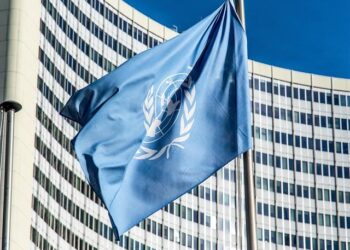RIGA – Latvia’s parliament has voted to withdraw from the international treaty banning landmines, signaling a shift in the Baltic nation’s security posture amid growing concerns over potential threats from neighboring Russia. The decision to exit the Mine Ban Treaty, announced Tuesday, marks a significant departure from Latvia’s longstanding commitment to international arms control agreements and underscores escalating regional tensions. As Riga navigates a complex security environment, the move reflects heightened caution and a reevaluation of defense strategies in response to evolving geopolitical challenges.
Latvia Withdraws from International Landmines Treaty Citing Security Concerns
In a decisive move reflecting escalating regional tensions, Latvia’s parliament has voted to withdraw from the 1997 Ottawa Treaty, a landmark international agreement banning the use of anti-personnel landmines. Officials cited emerging security threats stemming from Russia’s recent military posturing near the Baltic borders as the primary rationale behind the exit. The decision marks a significant shift in Latvia’s defense policy, emphasizing the need to maintain tactical flexibility in response to perceived aggressive maneuvers by its eastern neighbor.
Latvian defense spokespeople highlighted several critical factors influencing their stance, including:
- Strategic deterrence: Landmines are viewed as essential for protecting key border regions against rapid incursions.
- Alliance considerations: Coordination with NATO partners who have also expressed concerns about emerging threats.
- Technological adaptations: The implementation of advanced mine detection and remote-trigger capabilities to minimize civilian risks.
| Key Date | Event |
|---|---|
| 1997 | Ottawa Treaty adopted internationally |
| 2024 | Latvia announces withdrawal |
| 2024 Q3 | Official treaty exit takes effect |
Assessing the Implications of Latvia’s Decision on Regional Stability and Diplomatic Relations
The decision by Latvia’s parliament to withdraw from the international landmines treaty marks a significant shift in the Baltic nation’s defense policy, reflecting heightened security concerns amid escalating geopolitical tensions in Eastern Europe. By prioritizing national security, Latvia aims to enhance its military deterrence against potential threats, particularly from neighboring Russia. However, this move poses challenges to regional stability, as it signals a possible erosion of previously established arms control agreements that many countries in the region had championed. The withdrawal could encourage other Eastern European countries to reconsider their own commitments, potentially destabilizing the delicate balance achieved through years of diplomatic cooperation.
Key implications of Latvia’s decision include:
- Diplomatic Strain: Relations with neighboring countries, especially those committed to the treaty, may experience increased tension as trust in collective security frameworks weakens.
- Security Recalibration: Latvia’s defense forces might accelerate the deployment of defensive measures previously restricted under treaty obligations.
- International Reactions: Western allies, including NATO members, will be closely monitoring Latvia’s approach to ensure it aligns with broader regional security interests without provoking further escalation.
| Aspect | Potential Effect | Stakeholders |
|---|---|---|
| Regional Stability | Increased military posturing and uncertainty | Baltic States, Eastern Europe |
| Diplomatic Relations | Strain on alliances and treaty commitments | EU, NATO, Neighboring Countries |
| Security Policy | Flexible but riskier defense strategies | Latvian Armed Forces, Defense Analysts |
Strategic Recommendations for Balancing National Defense and International Humanitarian Commitments
In the complex geopolitical landscape surrounding Latvia, decision-makers face the critical challenge of ensuring national security without compromising longstanding humanitarian principles. The recent parliamentary move to exit the landmines treaty reflects a strategic pivot driven by emerging threats. Maintaining this delicate equilibrium requires innovative policies that can simultaneously bolster defense capabilities and uphold international commitments.
Key recommendations for policymakers include:
- Enhanced surveillance and detection technologies: Investing in cutting-edge mine detection systems to protect both civilians and soldiers.
- International collaboration: Engaging with allies to share intelligence and develop joint response protocols.
- Clear communication strategies: Transparently addressing concerns about treaty withdrawal to sustain diplomatic goodwill.
- Humanitarian clearance teams: Training specialized units tasked with rapid mine clearing post-conflict.
| Strategic Focus | Key Action | Expected Outcome | |||
|---|---|---|---|---|---|
| Surveillance | Deploy UAV and sensor networks | Early threat detection | |||
| International Relations | Multilateral security pacts | Strengthened defense alliances | |||
| Humanitarian Efforts | Mine clearance teams | | Strategic Focus | Key Action | Expected Outcome | |
| Surveillance | Deploy UAV and sensor networks | Early threat detection | |||
| International Relations | Multilateral security pacts | Strengthened defense alliances | |||
| Humanitarian Efforts | Mine clearance teams | Minimized civilian casualties |
—
### Summary
The geopolitical challenges faced by Latvia regarding landmine security demand a nuanced approach that balances defense and humanitarian values. By investing in advanced surveillance technologies, fostering international partnerships, maintaining transparent communications, and deploying specialized mine clearance teams, Latvia can strengthen its national security stance while minimizing harm to civilians and sustaining diplomatic goodwill. These measures collectively aim to provide early threat detection, reinforce alliances, and promote responsible post-conflict recovery.
Insights and Conclusions
Latvia’s decision to withdraw from the global landmines treaty marks a significant shift in its defense policy amid rising regional tensions. As concerns over potential threats from Russia persist, Riga faces the complex challenge of balancing international humanitarian commitments with national security imperatives. The move is likely to attract both domestic scrutiny and international attention as Latvia navigates an increasingly uncertain security landscape.
















